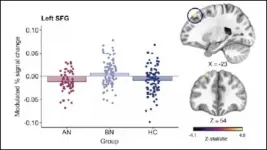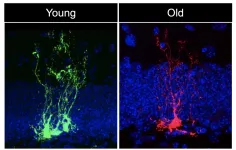INFORMATION:
Differences in B cell responses to coronaviruses and other pathogens in children and adults
2021-04-12
(Press-News.org) Blood taken from a small group of children before the COVID-19 pandemic contains memory B cells that bind SARS-CoV-2 and weakly cross-react with other coronaviruses, a new study finds, while adult blood and tissue showed few such cells. "Further study of the role of cross-reactive memory B cell populations... will be important for ongoing improvement of vaccines to SARS-CoV-2, its viral variants, and other pathogens," the authors say. As the COVID-19 pandemic has continued, children have often exhibited faster viral clearance and lower viral antigen loads than adults; whether B cell repertoires against SARS-CoV-2 (and other pathogens) differ between children and adults, contributing to differential responses, remains unknown. More broadly, it is still unclear how B cell memory to different antigens distributes in human tissues and changes during an individual's lifespan. To study this, Fan Yang et al. analyzed blood samples taken from pre-pandemic children and pre-pandemic adults. They also studied blood and tissue samples from deceased organ donors. The authors analyzed B cell receptor (BCR) repertoires - which reveal the antigen a B cell targets - specific to six common pathogens as well as two viruses the participants had not encountered before: Ebola virus and SARS-CoV-2. In comparison to adults, pre-pandemic children not only had higher frequencies of convergent (shared) B cell clones in their blood for pathogens they have encountered, but also higher frequencies of class-switched convergent B cell clones against SARS-CoV-2 and its viral variants. Adult blood and tissues showed few such clones. Notably, neither children nor adults had many BCRs for Ebola virus, highlighting the contrast to SARS-CoV-2 and other human coronaviruses commonly encountered prior to the current pandemic. "We hypothesize that previous [coronavirus] exposures may stimulate cross-reactive memory, and that such clonal responses may have their highest frequencies in childhood," the authors say. The results highlight the prominence of early childhood B cell clonal expansions and cross-reactivity for future responses to novel pathogens.
ELSE PRESS RELEASES FROM THIS DATE:
Bottom-up is the way forward for nitrogen reduction at institutions
2021-04-12
WOODS HOLE, Mass. -- Nitrogen is an element basic for life -- plants need it, animals need it, it's in our DNA -- but when there's too much nitrogen in the environment, things can go haywire. On Cape Cod, excess nitrogen in estuaries and salt marshes can lead to algal blooms, fish kills, and degradation of the environment.
In a study published in Environmental Research Letters, scientists at the Marine Biological Laboratory (MBL) Ecosystems Center examine ways to reduce the nitrogen footprint of smaller institutions, like the MBL, by focusing on a bottom-up approach.
"This bottom-up approach is all about balancing the needs of various stakeholders to come up with the best, ...
Road salts and other human sources are threatening world's freshwater supplies
2021-04-12
When winter storms threaten to make travel dangerous, people often turn to salt, spreading it liberally over highways, streets and sidewalks to melt snow and ice. Road salt is an important tool for safety, because many thousands of people die or are injured every year due to weather related accidents. But a new study led by Sujay Kaushal of the University of Maryland warns that introducing salt into the environment--whether it's for de-icing roads, fertilizing farmland or other purposes--releases toxic chemical cocktails that create a serious and growing global threat to our freshwater supply and human health.
Previous studies by Kaushal and his team showed that added salts in the environment can interact with soils and infrastructure to release a cocktail of metals, ...
Researchers engineer probiotic yeast to produce beta-carotene
2021-04-12
Researchers have genetically engineered a probiotic yeast to produce beta-carotene in the guts of laboratory mice. The advance demonstrates the utility of work the researchers have done to detail how a suite of genetic engineering tools can be used to modify the yeast.
"There are clear advantages to being able to engineer probiotics so that they produce the desired molecules right where they are needed," says Nathan Crook, corresponding author of the study and an assistant professor of chemical and biomolecular engineering at North Carolina State University. "You're not just delivering drugs or nutrients; you are effectively manufacturing the drugs or nutrients on site."
The study focused ...
Spanking may affect the brain development of a child
2021-04-12
Spanking may affect a child's brain development in similar ways to more severe forms of violence, according to a new study led by Harvard researchers.
The research, published recently in the journal Child Development, builds on existing studies that show heightened activity in certain regions of the brains of children who experience abuse in response to threat cues.
The group found that children who had been spanked had a greater neural response in multiple regions of the prefrontal cortex (PFC), including in regions that are part of the salience network. These areas of the brain respond to cues in the environment that tend ...
UConn researchers find bubbles speed up energy transfer
2021-04-12
Energy flows through a system of atoms or molecules by a series of processes such as transfers, emissions, or decay. You can visualize some of these details like passing a ball (the energy) to someone else (another particle), except the pass happens quicker than the blink of an eye, so fast that the details about the exchange are not well understood. Imagine the same exchange happening in a busy room, with others bumping into you and generally complicating and slowing the pass. Then, imagine how much faster the exchange would be if everyone stepped back and created a safe bubble for the pass to happen unhindered.
An international collaboration of scientists, including UConn Professor of Physics Nora Berrah and post-doctoral researcher ...
Antidepressant use in pregnancy tied to affective disorders in offspring; no causal link
2021-04-12
New York, NY - Major depressive disorder is highly prevalent, with one in five people experiencing an episode at some point in their life, and is almost twice as common in women than in men. Antidepressants are usually given as a first-line treatment, including during pregnancy, either to prevent the recurrence of depression, or as acute treatment in newly depressed patients. Antidepressant use during pregnancy is widespread and since antidepressants cross the placenta and the blood-brain barrier, concern exists about potential long-term effects of intrauterine antidepressant exposure in the unborn child.
Using the Danish National Registers to follow more than 42,000 singleton babies born ...
Binge-eating is not caused by stress-induced impulsivity
2021-04-12
Stress alters brain activity in self-inhibition areas yet doesn't trigger binge-eating, according to new research published in JNeurosci.
People who binge-eat, a hallmark symptom of several eating disorders, can feel out of control and unable to stop, and often binge after stressful events. This led scientists to theorize stress impairs the brain regions responsible for inhibitory control -- the ability to stop what you are about to do or currently doing -- and triggers binge-eating.
Westwater et al. tested this theory by using fMRI to measure the brain activity of women with anorexia, bulimia, or without ...
Stress does not lead to loss of self-control in eating disorders
2021-04-12
A unique residential study has concluded that, contrary to perceived wisdom, people with eating disorders do not lose self-control - leading to binge-eating - in response to stress. The findings of the Cambridge-led research are published today in the Journal of Neuroscience.
People who experience bulimia nervosa and a subset of those affected by anorexia nervosa share certain key symptoms, namely recurrent binge-eating and compensatory behaviours, such as vomiting. The two disorders are largely differentiated by body mass index (BMI): adults affected by anorexia nervosa tend to have BMI of less than 18.5 kg/m2. More than 1.6 million people in ...
USC Stem Cell study reveals neural stem cells age rapidly
2021-04-12
In a new study published in Cell Stem Cell, a team led by USC Stem Cell scientist Michael Bonaguidi, PhD, demonstrates that neural stem cells - the stem cells of the nervous system - age rapidly.
"There is chronological aging, and there is biological aging, and they are not the same thing," said Bonaguidi, an Assistant Professor of Stem Cell Biology and Regenerative Medicine, Gerontology and Biomedical Engineering at the Keck School of Medicine of USC. "We're interested in the biological aging of neural stem cells, which are particularly vulnerable to the ravages of time. This has implications for the normal cognitive decline that ...
Following atoms in real time could lead to better materials design
2021-04-12
Researchers have used a technique similar to MRI to follow the movement of individual atoms in real time as they cluster together to form two-dimensional materials, which are a single atomic layer thick.
The results, reported in the journal Physical Review Letters, could be used to design new types of materials and quantum technology devices. The researchers, from the University of Cambridge, captured the movement of the atoms at speeds that are eight orders of magnitude too fast for conventional microscopes.
Two-dimensional materials, such as graphene, ...




